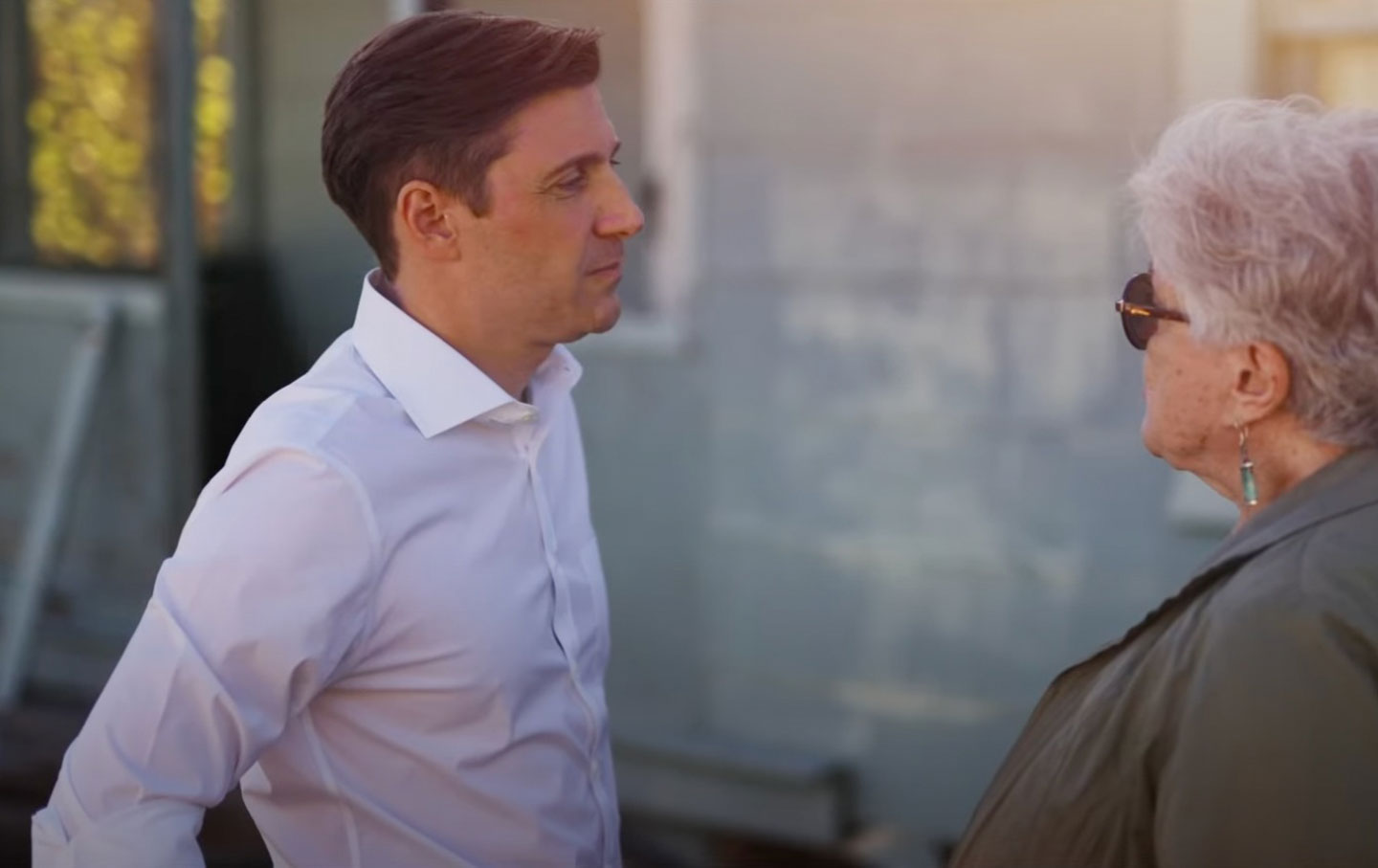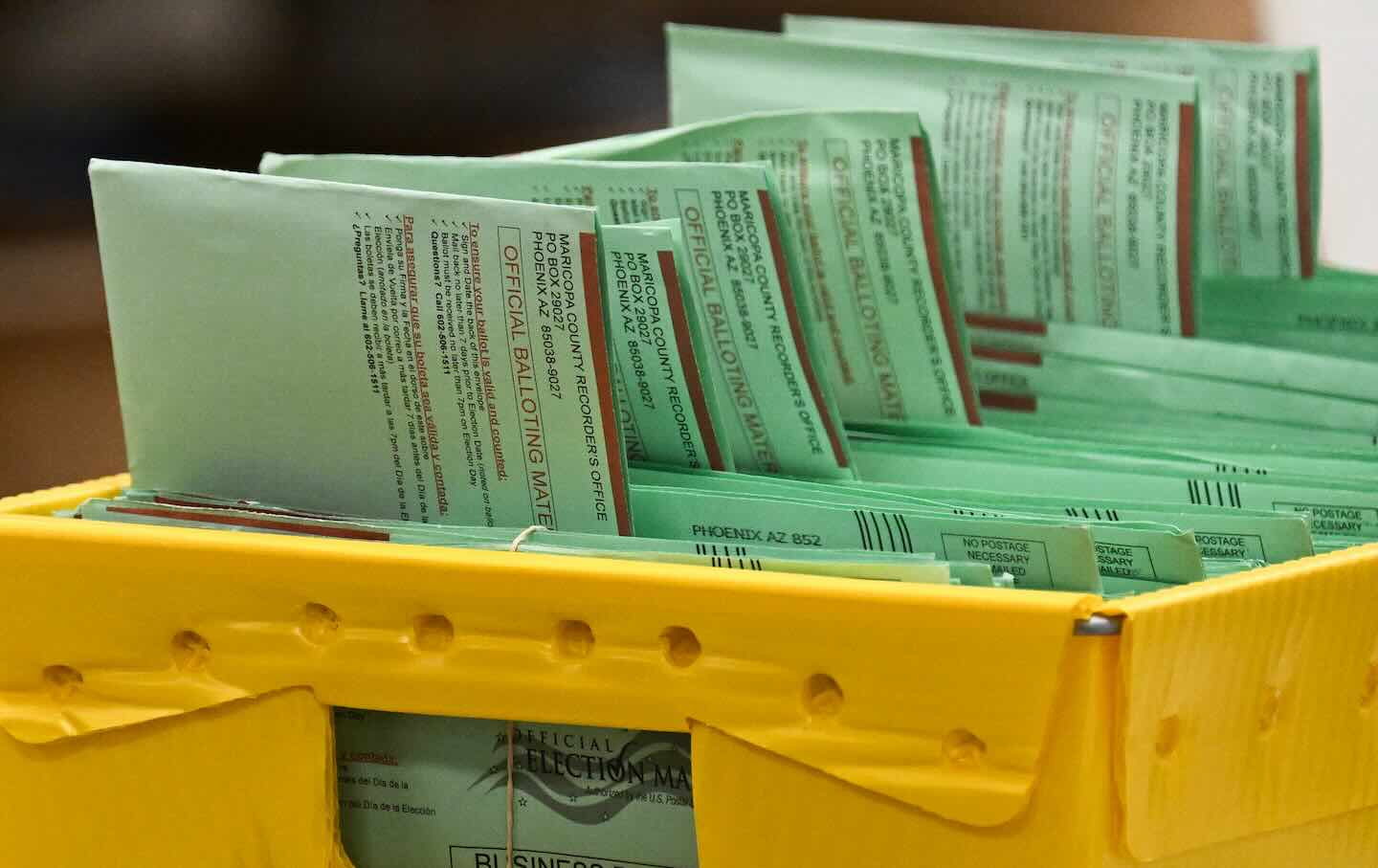Can Louisiana Use the Treasurer’s Office to Invest in the Working Class?
Dustin Granger sees the position as a potential antidote to Republican Governor-elect Jeff Landry, but the progressive candidate still faces an uphill battle in the upcoming November runoff.

In late September, citizens of Avoyelles Parish, the heart of Louisiana, gathered to hear candidates give their stump speeches mere weeks out from the Saturday, October 14, primary election. Among the batch of elected hopefuls, the majority-white, majority-Republican community listened to Dustin Granger, the progressive Democratic candidate for state treasurer. One Republican in particular, a man wearing a T-shirt with former president Donald Trump’s image splashed across his chest, seemed especially moved by Granger’s calls for progressive economic reform.
“The message is universal. The guy with the Trump shirt was nodding his head the whole time, and another gentleman came up and said, ‘Wow. Keep saying that over and over. You got my vote,’” Granger said.
Granger, a financial adviser from Lake Charles, is one of the three statewide Democratic candidates left standing following a disastrous primary election that resulted in the Democratic Party’s losing the governorship outright and without a runoff—a result few political pundits saw happening. Governor-elect Jeff Landry, a Republican in the same vein as Florida Governor Ron DeSantis, will helm Louisiana over the next four years. The Republican-dominated legislature, featuring a multitude of conservative Democrats, will provide plenty of support to Landry during his term.
Granger will once again vie for the treasurer’s seat in the November 18 runoff election. Admittedly, he has an uphill battle to climb; he’s the underdog in the runoff against Republican former representative John Fleming, a longtime political careerist looking to boost his state profile; he’s representing a devastatingly mismanaged state Democratic Party; and, finally, he’s running in what will likely be a low-turnout election.
But what sets him apart from almost all other Louisiana Democrats—and what will give him a fighting chance on Saturday—is the populist messaging at the heart of his campaign.
Granger is a staunch opponent of Louisiana’s rampant economic malfeasance—the real issue taking a toll on people’s lives in the Pelican State. Working-class people of all backgrounds have seen funding to public benefits continuously stripped from the state budget. “Our economy is a classic case of trickle-down economics, where we have all the giveaways to people at the top, including the wealthy and multinational corporations. They get the giveaways and tax breaks and that’s by design,” said Granger. “That leads to cuts in public investment, health and education, and when the legislature can’t cut anymore, they end up raising taxes on working people. It happens over and over again.”
Southern conservative politics is riddled with bigoted dog whistles meant to play on working-class white people’s underlying prejudices in the interest of maintaining corporate profits. In essence, Republicans’ regressive “culture war” policies serve as a distraction while they “pick all of our pockets,” as Granger puts it. He wants to cut through the noise and use the treasurer’s office as a bastion for working-class people, investing in Louisiana citizens by advocating for strengthened climate protections and green energy job policies, a living wage, insurance reform and premium insurance assistance; addressing food and banking deserts prevalent in small towns; and protecting civil rights—which will keep young people from leaving the state in droves.
As the state’s progressive economic leader, Granger would also serve as a vital check on Landry’s far-right administration. The treasurer is the head of the State Bond Commission, which, among other things, uses the state’s debt to fund infrastructure projects, meaning Granger would have an outsize voice on how millions of state funds should be allocated. The position is also constitutionally required to advise Landry and the legislature on the state’s economic climate before the legislative session begins, meaning he can potentially steer budget discussions in ways that will benefit Louisiana’s working-class majority.
“People just want somebody to explain what’s happening, make it make sense to them, and also let them know the division they’re always seeing is by design. It’s designed to hurt everybody except the small, greedy few people at the top. They’re the only people who make out good from this,” Granger said.
Most Louisiana Democrats avoid advocating for progressive values, thinking it will harm their reelection prospects. Yet, as Granger proved in ruby-red Avoyelles Parish, speaking truth to power will resonate with working-class people, regardless of political affiliation. Democrats cannot shy away from this runoff election, lest they risk ceding full control to a far-right administration eager to terrorize the state’s most vulnerable citizens for years to come. Instead, Democrats need to embrace Granger’s progressive bona fides—and join him.
Read the rest of StudentNation’s dispatches on the 2023 election here.
Take a stand against Trump and support The Nation!
In this moment of crisis, we need a unified, progressive opposition to Donald Trump.
We’re starting to see one take shape in the streets and at ballot boxes across the country: from New York City mayoral candidate Zohran Mamdani’s campaign focused on affordability, to communities protecting their neighbors from ICE, to the senators opposing arms shipments to Israel.
The Democratic Party has an urgent choice to make: Will it embrace a politics that is principled and popular, or will it continue to insist on losing elections with the out-of-touch elites and consultants that got us here?
At The Nation, we know which side we’re on. Every day, we make the case for a more democratic and equal world by championing progressive leaders, lifting up movements fighting for justice, and exposing the oligarchs and corporations profiting at the expense of us all. Our independent journalism informs and empowers progressives across the country and helps bring this politics to new readers ready to join the fight.
We need your help to continue this work. Will you donate to support The Nation’s independent journalism? Every contribution goes to our award-winning reporting, analysis, and commentary.
Thank you for helping us take on Trump and build the just society we know is possible.
Sincerely,
Bhaskar Sunkara
President, The Nation








